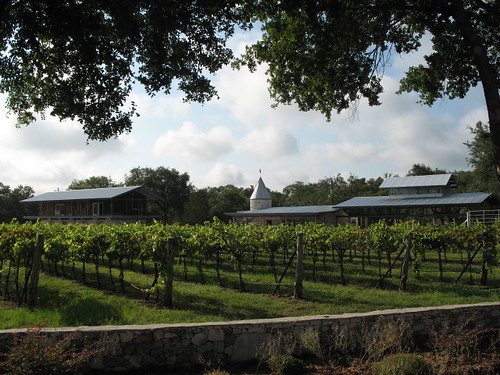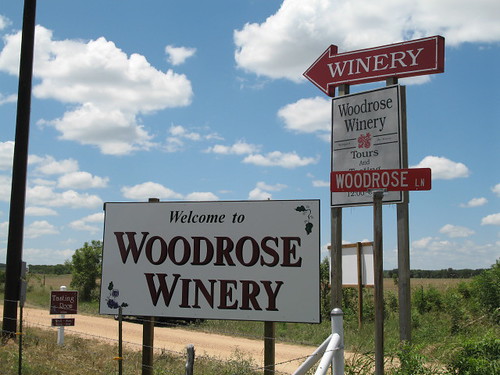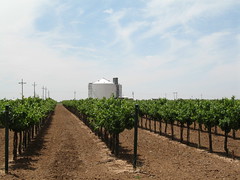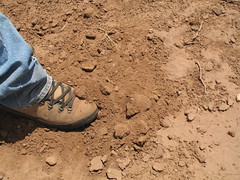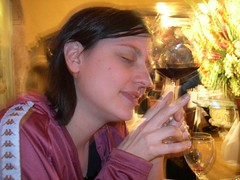Interview: Jeffery Ivy, Dry Comal Creek Vineyards
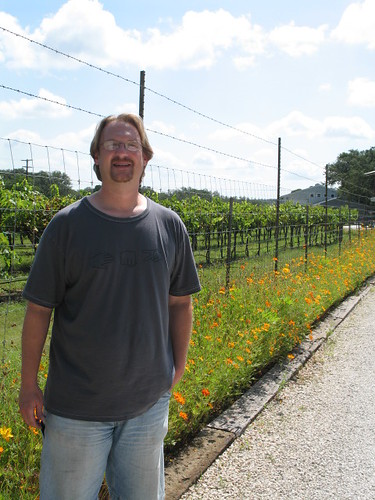 Jeffery Ivy: Texas boy goes off to seek his winemaking fortune in California, and returns to make a difference in Texas wine. Now, this is the kinda story I like very much. Having started his career as a retailer in Austin, he soon found that the retailing biz was less than rewarding, and so began harvesting and cellar work for the likes of Slaughter-Leftwich, Gregory Graziano (Domaine St. Gregory) and Quivera and even tucked in a bit of distillation experience at Germain-Robin, makers of "some of the best brandy on the planet, bar none" in Mendocino County. Finally making his way to head winemaker over a course of a decade (Roshambo Winery, Healdsburg), he felt the tug to bring his winemaking skills home.
Jeffery Ivy: Texas boy goes off to seek his winemaking fortune in California, and returns to make a difference in Texas wine. Now, this is the kinda story I like very much. Having started his career as a retailer in Austin, he soon found that the retailing biz was less than rewarding, and so began harvesting and cellar work for the likes of Slaughter-Leftwich, Gregory Graziano (Domaine St. Gregory) and Quivera and even tucked in a bit of distillation experience at Germain-Robin, makers of "some of the best brandy on the planet, bar none" in Mendocino County. Finally making his way to head winemaker over a course of a decade (Roshambo Winery, Healdsburg), he felt the tug to bring his winemaking skills home.Jeff is the new winemaker for Dry Comal Creek winery, a small but very cute winery way out in the Western Hill Country near San Antonio. Dry Comal Creek is famous for their eye-catching labels and for a previous vintage of a dry style wine from Black Spanish, or Lenoir grapes. The former recognition is a positive one; the latter is not. Said Black Spanish wine is very, very bad. Other wines they make are pretty good. They're just not Texas wines. Because of the difficulty in finding good grapes in this part of the Hill Country, many small outfits like Dry Comal Creek source their fruit from outside the state. Texas is not the only state who does this, not by a longshot. But all the same, I think it is a consumer's right to know this.
Jeff is working not only to improve that poorly made Black Spanish, but to use his knowledge to make the Dry Comal Creek line a distinctive one. One of the ways Jeff has correct the Black Spanish issue is to make a rose from it, a cool blended summer wine that is perfectly nice. That's what happens when you have a good, experienced winemaker who can turn around trouble. Take note, people.
Interview with Jeffery Ivy, Dry Comal Creek
C & D: Take me back to what it was like to come back to Texas after your California adventures. What did you find here?
Jeff: I had always thought when I moved to California that someday I would come back. I didn't think I would have the capital to buy property or start a brand in California. Someone like me who wants to have a little place, grow a few acres of grapes and make a little bit of wine, it's just not feasible unless you have a whole lot of money to start out with. So Texas was a better situation because my family owns land here already. When I talked to my friends here that were still in the business, it seemed like there was a renaissance going on here...(Texas) went from forty wineries to over a hundred in less than ten years. That told me two things: one, that there were people with money who were willing to start things, and two, that they might need a professional winemaker. I think the thing that cemented it for me was that I was here in November of '05 for the New World Wine and Food Festival in San Antonio and shared a winemaker dinner with Kim McPherson and tasted his viognier and his rose and I was like, well, if these wines can be made in Texas, then I'm on board. They were very good wines, and I'm not even talking just solid or clean, they were very good, they were distinctive. Some of the wines from Jim Johnson...I'm like, this can be done here. There's just another level of dedication that has to be here. You don't have the quality of your base resource like you do in California. People might disagree with me, but it's pretty easy to make wine in California because you have an abundance of really good grapes. Whereas in Texas, if you're trying to make wine from Texas grapes you don't always have the luxury of quality fruit.
So what sort of thing do you have to do to compensate for that in the winemaking process?
A lot of years, because of the weather, you're not going to get the grapes as ripe as you'd like them. Sometimes you have to bump the sugar up to get the alcohol you want. Tropical rainstorms that come off the Gulf...it rains for two weeks straight, and your grapes are stuck at 18 brix and going nowhere. Sometimes it's so hot that they shut down for the season. You either pick them or you're left with raisins. Especially in the Hill Country. Maybe that's not such an issue in the High Plains, I don't know. With reds in Texas you have to deal with the fact that you have a much shorter growing season, and with vinifera you don't have the development of tannins and...not a lot of color to work with. You have to augment that. The point I'm trying to make is that here you have to be prepared to augment to make the wine you want to make.
Tell me what you walked into, coming into Dry Comal Creek.
Well, the winery was a bit of a mess. There were wines in tank that had not been managed, at all. They were contaminated with bret, that had to be dealt with. I also had to clean barrels that hadn't been maintained. And I knew that was what I was walking into, that the winery had been neglected by the previous winemaker, and that was one of my first jobs, was to clean the place up. But I've seen worse in California, it's not exclusive to Texas. One of the things I had to do was to start developing sanitation protocols, things that get done regularly, all the time.
Currently, the majority of the wine you make comes from fruit sourced from California and other states. What dictates where you get these grapes?
In the past, it has been price. I know that, for example, the sauvignon blanc and the chardonnay come from Temecula, that was a contact that was brought to us by a consulting winemaker, Dr. Enrique Ferro. I still use him...he's a nice resource to have because he's a great chemist and I'm not a chemist.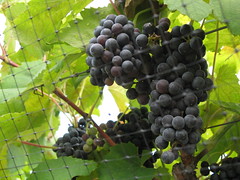
Now those come to you as juice, correct?
Yes. Or in some instances, it comes as finished wine. The sauvignon blanc comes as finished wine. The colombard comes as juice, which is good because...one, it's unique and no one does it, and two because it's readily available, and Franklin has a good relationship with California Concentrate who processes the juice for us.
If suddenly all your dreams came true, in terms of available resources, what you could get your hands on, and what you could do, what would that look like?
I'd like to have a 10 to 20 acre vineyard, and estate vineyard that was planted with syrah, grenache, mourvedre, some cinsault, maybe...I'm still working out in my head what varieties will do well here...
Now by here, do you mean the Hill Country?
I'm talking about the Northern Hill Country, San Saba County, because that's where my family has land. I've always had this idea that I'd have a ranch. And not just about grapes, you know, I'd have peach trees or pecan trees...just have a farm. And it wouldn't necessarily have to be huge...I'm not in this business to get rich. That's not why I do it. I do it because I love to make wine.
*****
Texas Wine Question O' The Day: Why should I call wine made from California or New Mexican grapes Texas wine? Let me know.
Clinkies.

